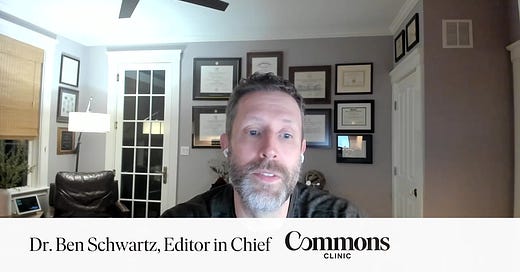Presented by Commons Clinic
According to McKinsey, the global wellness market now tops $1.5 trillion with a annual growth rate of 5-10%. Consumers are expected to increase their spending on products and services that allow them to live not just longer, but better.
Healthspan—the period of life spent in good health— has become an increasingly popular concept. It’s no longer about increasing life expectancy; it’s about living healthy late into life.
How does one achieve healthspan? What blindspots prevent the traditional system from fully embracing the concepts of holistic health, wellness, and prevention? Can we evolve from “reactive” healthcare that focuses on treating existing problems to “proactive” healthcare that prevents them in the first place?
This week, I’m pleased to share my conversation with Dr. Dan Durand, Chief Medical Officer of Prenuvo and President of the Prenuvo Medical Group. Dan has held many fascinating roles throughout his career — all with the common thread of bringing clinician-led innovation and entrepreneurship to the forefront.
I’ve been a skeptic of whole-body MRIs, extensive lab testing, and the idea of longevity medicine. But, as I continue to think about the challenges facing our system, it’s clear that we can’t just focus on optimizing the downstream.
Without reducing demand through better prevention and wellness, we simply don’t stand a chance of controlling costs, improving outcomes, and evolving the system. There’s a fine line between pseudo-science and evolved healthcare we can no longer ignore.
In our conversation, Dan and I discussed his unconventional career path, the promise (and pitfalls) of whole-body MRI, prevention, and longevity, and why both doctors and entrepreneurs need to rethink how we define healthcare.
Enjoy!
Key Insights from Our Conversation:
1. The Path to Healthcare Innovation
Physicians are increasingly interested in breaking into health tech, innovation, and entrepreneurship. Dan’s advice — follow your curiosity and be willing to take risks. His career has spanned multiple clinical leadership and innovation roles, advisory roles with startups and Fortune 500 companies, and now his work at Prenuvo. While there’s no set blueprint, Dan found opportunities, took calculated risks, and embraced the uncomfortable process of learning outside traditional medicine. For doctors considering a similar path, he emphasizes understanding healthcare economics, getting involved in advisory roles, and building a strong network.
2. Why the Traditional Healthcare System Struggles with Prevention
One of traditional medicine’s biggest shortcomings: we wait until people are sick before gathering meaningful health data. Genomics, advanced imaging, and multi-omics have been around for years, but most patients don’t benefit until something goes wrong. Health, wellness, and prevention interventions like whole-body MRI and liquid biopsies are trying to change that by gathering proactive data on health. The challenge? Convincing both doctors and payers that shifting resources upstream reduces long-term costs rather than increasing them. (I’ve been a skeptic here, but Dan does a great job reframing the discussion.)
3. The False Dichotomy of "Overdiagnosis" v. "Early Detection"
A common (and valid) criticism of whole-body MRI, comprehensive lab screening, and other non-traditional screening tools is that they lead to too many false positives. But as Dan puts it, this is a problem of data interpretation, not data collection. The argument that "we shouldn’t screen because we might find things" ignores the fact that the entire premise of modern medicine is to find things before they become catastrophic. The issue isn’t necessarily incidentalomas—it’s how we train clinicians to contextualize and act on new and how we communicate findings to patients.
4. Doctors and Investors Need to Rethink Their Role
Dan and I discussed how both sides of the healthcare equation—doctors and entrepreneurs—need to reframe their thinking:
Doctors need to move beyond the defensive "first, do no harm" mindset that resists change at the expense of innovation.
Venture capitalists and startups need to stop seeing healthcare as a purely financial or technological problem and take the Hippocratic Oath themselves—ensuring that their solutions actually benefit patients, not just investors.
These concepts aren’t as controversial as they seem. Embracing change doesn’t mean abandoning strong clinical leadership or delivering inappropriate patient care. Non-clinicians taking the Hippocratic Oath (or at least taking some measure of responsibility for clinical outcomes) is a necessary evolution in the sustainability of healthcare innovation.
5. AI, Data, and the Future of Personalized Medicine
AI will play a critical role in making personalized prevention a reality. As imaging, lab diagnostics, and real-time monitoring improve, AI will help sift through massive amounts of data, identifying patterns that physicians can use to intervene earlier. The challenge isn’t the data itself—it’s making sure clinicians aren’t drowning in it and that insights are actionable, relevant, and patient-centered.
6. A Healthcare System That Works for Patients
At the end of the day, both traditional medicine and health tech have a blind spot: the patient. The healthcare system is built for payers, health systems, and regulators—not the people it’s supposed to serve. Physicians often don’t fully understand the patient’s frustrations, and entrepreneurs often don’t understand the nuances of care delivery. The real opportunity lies in marrying medical expertise with tech-driven efficiency—freeing up doctors to engage and educate patients. Technology should be an enabler, not a distractor.
My conversation with Dan was one of the most thought-provoking discussions I’ve had on how we need to rethink healthcare, technology, and prevention. If you’re a physician interested in innovation, an investor trying to understand healthcare, a consumer interested in wellness and prevention, or just someone thinking about how we shift from a reactive system to a proactive one—you won’t want to miss this episode!
(I’ve been thinking and writing about these issues a lot recently. If you’re interested, companion articles can be found here, here, and here).
Ben Schwartz, MD, MBA
Editor-in-Chief, The Surgeon’s Record
Commons Clinic Senior Clinical Fellow
Thanks for watching The Surgeon's Record webinar! Subscribe for free to receive new posts and support our work.















Share this post